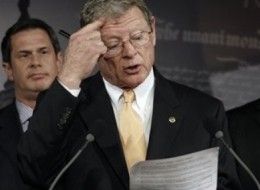Maybe someone can edit the video to go something like this:
Godfrey Jones: He was an everyday TV weatherman who devoted himself to kids. Until the night a grossly smug intellectual named Michael Mann gave him a crash course in elitism. "Weatherman, and the Wonk!"
Michael Mann: Somebody had to look at the data. Then I noticed it was sitting in the way of some sweet grants. I grabbed the sweet grants. Just thinking about the grants. I just wish I had the sweet, sweet, sw-sw-sw-sweet grants.
Godfrey Jones: So, Dr. Mann, you admit you massaged the data. What do you have to say in your defense? [freeze frame]. Dr. Mann, your silence will only incriminate you further. [freeze frame]. No, Dr. Mann, don't take your anger out on me! Get back, get back! Dr. Mann, noooo!
(falsification of data may not have happened)
We could even call it "Michael Badmann" after the name of the Simpsons episode ("Homer Badman").
Godfrey Jones, meet Anthony Watts and Steve McIntyre - some of their tactics would put even you to shame. One of the most egregious examples of deniers hitting Rock Bottom is how they've taken this email out of context:
At 16:54 27/10/2009, Michael Mann wrote:
thanks Phil,
Perhaps we'll do a simple update to the Yamal post, e.g. linking Keith/s new page--Gavin t?
As to the issues of robustness, particularly w.r.t. inclusion of the Yamal series, we actually emphasized that (including the Osborn and Briffa '06 sensitivity test) in our original post! As we all know, this isn't about truth at all, its about plausibly deniable accusations.
Sounds bad, right? Except that, as Mann points out, he is referring to denier Steve McIntyre as the person for whom "this isn't about truth," not Mann himself. I can vouch that Dr. Mann is talking about skeptics, because I also called out McIntyre for using the "plausibly deniable accusations" tactic - on this exact same issue - three weeks before the above email was written. Comparing McIntyre to House Minority Whip Eric Cantor (R-VA), here's what I wrote:
This is a time honored strategy of political rhetoric. Ask questions, make insinuations, repeat the same falsehoods over and over, without saying anything of substance - it creates doubt in the public's mind, while still allowing you to deny charges of "lying." If someone points out that nowhere does the health care reform bill "require" you to drop your current insurance plan, Cantor can plausibly maintain, "I never said that it would," while still convincing a sizeable portion of the public otherwise...
What's clear is that McIntyre and his ilk aren't interested in the debate over evidence, or even in proving global warming false - the strategy is simply to sow doubt... ask vague questions to create an atmosphere of doubt and suspicion; when those questions are in fact answered, continue to assert that the questions were never answered to make it look like scientists are hiding something. And when people get tired of repeatedly answering the same debunked claims, cry foul and proclaim your views are being suppressed.
With the CRU emails, deniers have swung into full strategy execution mode. Speaking of which, here's the relevant section from the very next email in the chain, which makes clear Mann was referring to McIntyre as the party who doesn't care about "truth":
I'll let you make up you own minds! It seems to me as though McIntyre cherry picked for effect.
There is an additional part that shows how many series from Ch 6 of AR4 used Yamal - most didn't! Also there is a sensitivity test of omitting it - which comes from the Supplementary Info with Osborn and Briffa (2006). As expected omitting it makes very little difference. To get to this follow the links from the above link.
McIntyre knows that the millennial temperature record is pretty robust, otherwise he would produce his own series. Similarly the instrumental temperature is even more robust, which he also knows.
In other words, disingenous people actually took an email calling out SKEPTICS for not caring about truth, and untruthfully took it out of context to insinuate that climate scientists were talking about themselves! Case in point #24,601 why you should never believe a skeptic who says, "I just want transparency so we can get to the truth." I'm expecting something like this from the skeptic community:
Maybe I shouldn't wait up.
RELATED POSTS
What "hiding the decline" really looks like
A lesson in denial: Eric Cantor videos, global warming deniers, and how to say something without saying anything
The cold logic of hockey sticks
Finally! Fox News admits it isn't really news















